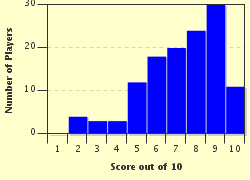Quiz Answer Key and Fun Facts
1. In which novel does Walter Eberhart, who is either a loving husband or wants to replace his wife with a robot, appear?
2. He may be a God-fearing reverend, but which character from Nathaniel Hawthorne's "The Scarlet Letter" also had an affair with Hester Prynne?
3. This next character's moral ambiguity really comes from the fact that he has no sense of right and wrong, which is understandable because he is made from the parts of dead people. He may be hideous and go on a murderous rampage, but inside, he really is just a sensitive soul. Who is this creature?
4. Is this Bronte man a good husband or lecherous scoundrel? That is for the readers to decide but he did keep his mentally unstable wife a secret so he could be with another girl whom he did love. Who is this man?
5. Which Shakespearean title character tried to do good and avenge the death of his father, but wound up killing an awful lot of innocent people along the way?
6. Which literary detective, who frequently mentions his Roman Catholic faith, has committed such morally dubious actions as faking his own death via explosion, letting a train full of murderers go scot-free, and who drugged and killed a person before killing himself?
7. In which novel can we find a morally ambiguous husband who killed his first wife, dumped her body on a boat, sunk the boat and then loves his second wife, who does not care her husband is a murderer?
8. Which heroine of young adult literature likely killed dozens of innocent teenagers to save herself and her crush, led a rebellion against a dictator, then killed the new would-be president with an arrow?
9. In which novel does a character named Sethe kill her baby daughter for what she believes is the justified reason of saving her from slavery?
10. Which Henrik Ibsen play ends with a mother debating whether she should kill her son or let him succumb to his debilitating disease?
Source: Author
Joepetz
This quiz was reviewed by FunTrivia editor
looney_tunes before going online.
Any errors found in FunTrivia content are routinely corrected through our feedback system.

